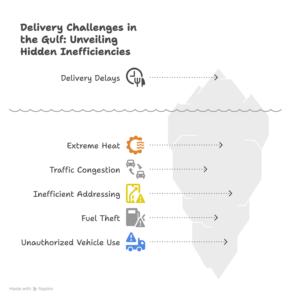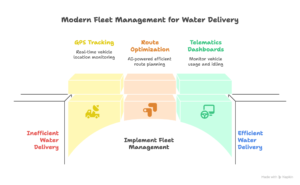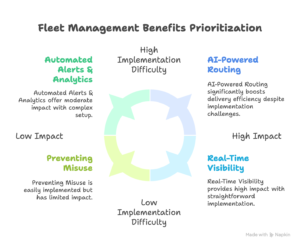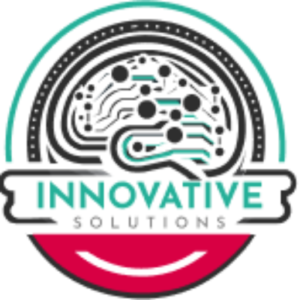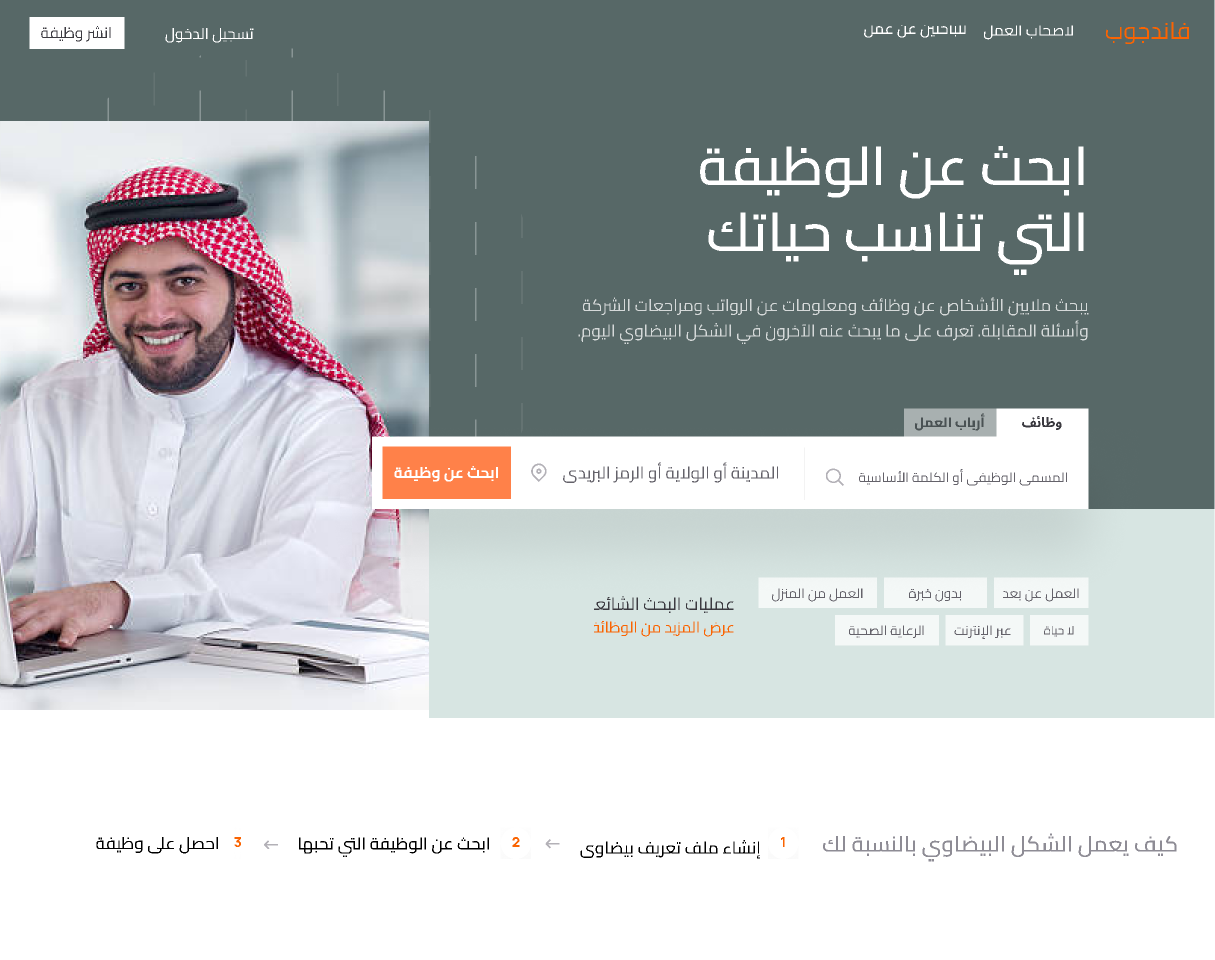Why Fleet Management Matters for GCC Water Delivery
Running a water delivery business in the Gulf means juggling rising demand, sweltering heat, and tight margins. The GCC bottled water market is already worth over $10.7 billion and growing[1], but many distributors still rely on manual systems and ad-hoc routes. In these conditions, any hiccup – a wrong turn, a traffic jam, or an idle engine – translates directly into lost time, wasted fuel and unhappy customers. In fact, industry experts note that extreme heat (45°C+), congested roads and unclear address systems are key drivers of delivery delays and soaring costs in the region[2]. When manual scheduling and outdated tools lead to late drops or missed deliveries, customer satisfaction plummets and operational costs spike[3][2].
Modern fleet management changes the game. Using GPS tracking and AI-powered route optimization, water suppliers can turn those challenges into opportunities. Real-time tracking and smart routing ensure that trucks take the fastest, safest paths (even avoiding unnecessary left turns like UPS’s famously efficient routes)[4][5]. Fleet telematics dashboards show exactly when and where each vehicle is, cutting idling and unscheduled use. In the GCC, such technologies are rapidly being adopted: the regional telematics market is projected to grow over 4× by 2033[6]. This isn’t a luxury – it’s now essential.
Key Challenges: Deliveries in the Gulf are constrained by factors like blistering heat, heavy trucks, and unpredictable traffic. A recent Bahrain logistics report highlights that “Extreme heat…traffic congestion, and inefficient address systems lead to delivery delays and higher costs.”[2]. These delays translate directly into extra fuel burn and customer complaints. Research on GCC fleets also flags rampant fuel theft and unauthorized vehicle use as hidden drains on profits[7]. Without visibility, drivers may idle for hours or run side-gigs in company trucks, inflating maintenance and insurance costs.
Fuel & Cost Inefficiencies: Fuel is often the single-largest expense for delivery fleets. Without monitoring, drivers may leave engines running in the midday heat or use trucks for personal errands. Studies show that telematics-enabled fleets can cut fuel usage 5–10% simply by spotting wasteful behavior[8]. Route optimization adds another 2–5% savings[4]. In Bahrain’s last-mile case study, AI route planning slashed delivery times by 30% and cut fuel costs by 20%[5]. Put together, better routing and real-time tracking regularly yield up to 30% faster deliveries and similar reductions in fuel spend[5][9]. Over a year, those savings can mean hundreds of thousands of dirhams back to the bottom line.
Customer Expectations & Reputation: GCC consumers – both residential and commercial – have little patience for late water orders. In fact, 93% of customers now demand real-time delivery tracking, and nearly half will abandon a brand that can’t provide it[10]. A tracking link that shows “Your water is 10 minutes away” transforms frustration into trust. By contrast, untracked late deliveries erode loyalty and invite complaints. Fleet management systems also improve reliability: automated alerts for delayed deliveries or low stock (as in the UAE’s new AI water platform) help resolve issues before the customer even notices[3][11].
Regulatory & Safety Compliance: GCC governments are tightening rules on vehicle safety, emissions and driver hours. Digital fleet systems automatically log compliance data – vehicle maintenance, driver IDs, routes – simplifying audits. For example, a GPS system can automatically shut off a truck nearing its legal driving limit, or notify managers of speeding and harsh braking. These controls don’t just improve safety; they protect your license to operate. As one industry report notes, telematics “monitor vehicle usage, idling times, and driver behavior to minimize fuel consumption and operational costs”[12], while also enforcing policies.
How GPS Tracking and Route Optimization Help
- Real-Time Visibility: A GPS map shows exactly where each delivery truck is and its ETA. Managers can reassign orders instantly if a van is delayed, and customers can get live ETAs. This transparency is a powerful trust-builder. Advanced platforms even offer geofences (alerts if a truck strays off-route) and historical route playback, so misuse is obvious[13].
- AI-Powered Routing: Modern software crunches traffic, delivery schedules, and vehicle loads to pick the best routes. By avoiding congestion and minimizing idle time, these tools routinely cut travel distance and time. In GCC tests, smart routing speeded deliveries 30% faster and cut fuel by 20%[5]. Even simple strategies (like limiting left turns) can save 2–5% on fuel[4].
- Automated Alerts & Analytics: Fleet dashboards flag exceptions – low fuel, maintenance due, unscheduled stops or speeding. This lets managers intervene quickly. On average, drivers coached with telematics data can improve fuel economy 5–10%[8]. Over time, analytics also reveal maintenance needs and optimal vehicle utilization.
- Preventing Misuse: GPS trackers are a strong deterrent. Employees know their routes are logged minute-by-minute, so unauthorized use drops dramatically[14]. If a vehicle does deviate, you get alerts immediately (for example, a pump truck leaving its delivery zone). The result is fewer accident liabilities and lower insurance claims.
Business Benefits in Practice
- Increased Efficiency: Smarter planning and dispatch means more deliveries per day. Many GCC companies report “significant cost savings” as they leverage telematics for faster, consolidated deliveries[12][9].
- Lower Operating Costs: Less fuel burn and maintenance – plus avoided fines – directly boosts profits. Studies show fleets can save up to 30% on fuel and related expenses with effective GPS & route optimization[9][8].
- Better Customer Service: Timely, predictable deliveries build loyalty. Keeping customers informed with live tracking and reliable arrival times turns them into repeat buyers[10]. In a fast-growing market (the GCC bottled water industry is expected to double by 2034[1]), reputation is everything.
- Compliance & Safety: Digital records of routes, hours, and vehicle inspections mean you can prove compliance at a moment’s notice. This reduces legal risks and aligns your fleet with evolving Gulf regulations.
- Scalability: As your business grows (tourism and population in the GCC keep climbing), managing dozens or hundreds of trucks manually becomes impossible. Fleet management software scales to any fleet size, so expansion doesn’t lead to chaos.
Take Action: Upgrade Your Fleet for the Future
The Gulf market is moving fast, and customers expect precision. If your competitors are still relying on clipboards and guesswork, there’s an opportunity to leap ahead. Implementing a modern fleet management system – with GPS tracking and intelligent routing – is not just about technology, it’s about transforming how you deliver water. Companies that adopt these solutions often see ROI in months through fuel savings and new capacity[5][8].
Don’t let inefficiency dilute your bottom line. By taking control of your fleet’s location, behavior and routes, you ensure every tanker truck is working optimally. The result? Happier customers, lower costs and a stronger competitive edge in the GCC’s booming water delivery market. Act now: evaluate a fleet management platform today and start turning data into delivery excellence.
Take Control with EchoSphere Technologies
At EchoSphere Technologies, we offer a Delivery and Fleet Management System designed specifically for water and beverage suppliers in the GCC.
Our platform offers:
- Route optimization based on live GCC traffic data
- GPS tracking and automatic driver behavior alerts
- Integration with delivery apps, POS, and customer notifications
- Maintenance schedules, fuel monitoring, and delivery logs
- Scalable dashboard for fleets of any size
If you’re ready to reduce operational costs, enhance customer satisfaction, and future-proof your water delivery business — EchoSphere can help.
🔗 Get in touch today to schedule a personalized demo or fleet audit:
Don’t just deliver water — deliver efficiency. Upgrade your fleet, streamline your operations, and take the lead in your market.
Sources: Industry reports and case studies from GCC fleets on telematics and delivery optimization[12][3][8][7][15].
[1] GCC Bottled Water Market Size, Share & Growth Rate, 2034
https://www.expertmarketresearch.com/reports/gcc-bottled-water-market
[2] [5] [9] [10] [15] Optimizing Last-Mile Delivery in GCC Urban Centers
https://www.mukani.com/optimizing-last-mile-delivery-in-gcc-urban-centers/
[3] [11] Sigosoft Launches UAE’s First AI-Assisted Water Delivery & Management Platform – Introducing Sigo Water – Sigosoft
https://sigosoft.com/blog/uaes-first-ai-assisted-water-delivery-management-platform-sigo-water/
[4] [8] Fuel-Saving Strategies Worth Trying in 2025 – Part 2 – FreightWaves
https://www.freightwaves.com/news/fuel-saving-strategies-worth-trying-in-2025-part-2
[6] [12] GCC Commercial Telematics Market Size & Forecast 2033
https://www.imarcgroup.com/gcc-commercial-telematics-market
[7] Combating Fuel Theft in GCC Countries with Advanced Fleet Management Solutions by Shareef N M :: SSRN
https://papers.ssrn.com/sol3/papers.cfm?abstract_id=5292091
[13] [14] Prevent Fleet Vehicle Misuse With GPS Fleet Tracking | ClearPathGPS
https://www.clearpathgps.com/blog/prevent-unauthorized-use-of-your-vehicles-with-gps-tracking


